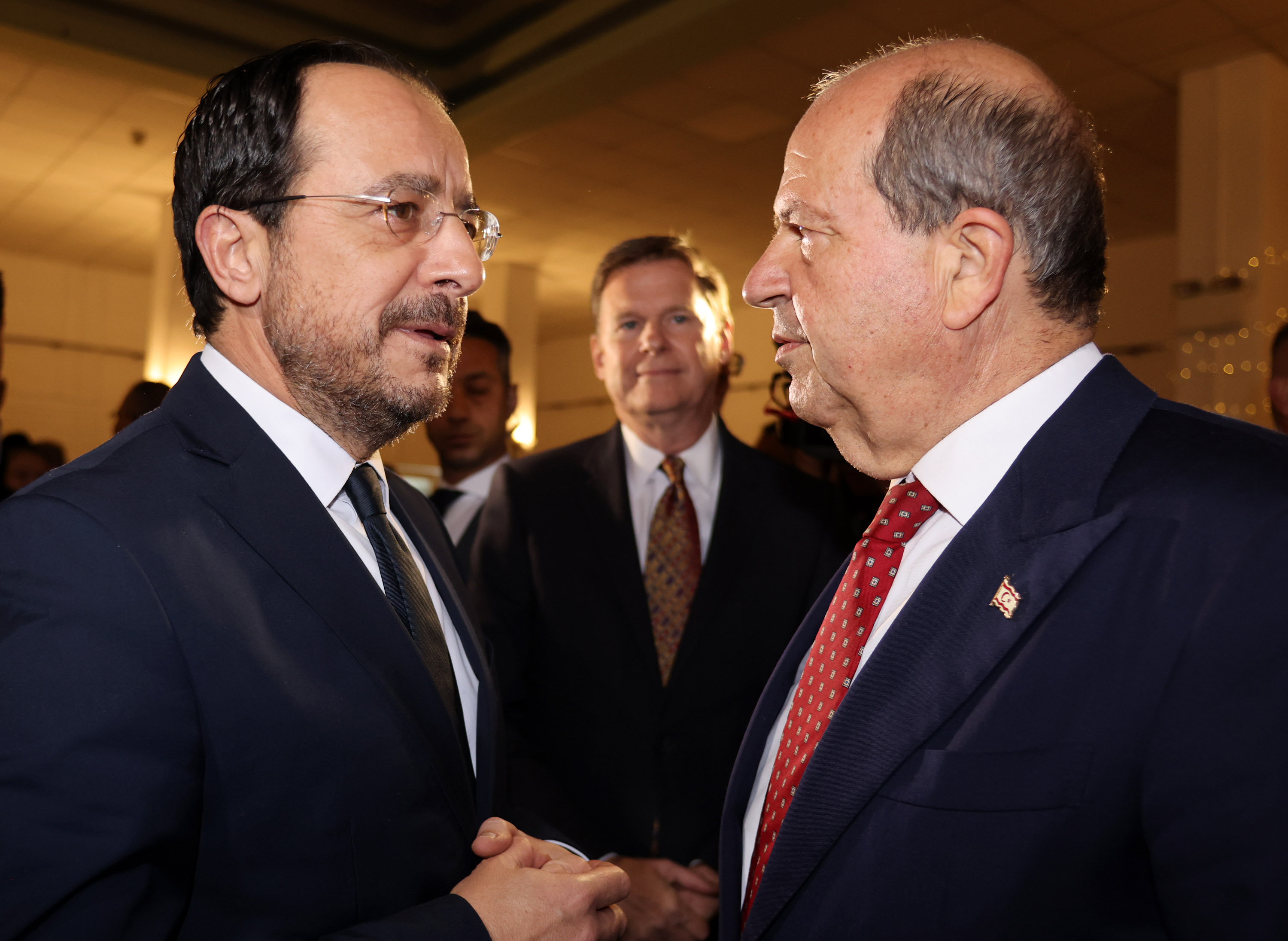Turkish Cypriot leader Ersin Tatar on Friday night announced that he would meet with President Nikos Christodoulides on either January 20 or January 21, and that the planned “enlarged meeting” on the Cyprus problem would take place in mid-March.
He was addressing a New Year’s reception at his official residence in northern Nicosia, and said the enlarged meeting was “our proposal”, adding, “we are continuing our policy of finding a solution on the basis of two-states alongside our motherland, the Republic of Turkey”.
However, deputy government spokesman Yiannis Antoniou denied that such a date had been set, telling the Cyprus Mail, “we do not have anything yet, we have not been informed of such a date”.
The lack of agreement over whether an agreement has been struck regarding a date for a meeting between the two leaders, which would centre on the matter of crossing points, echoes a similar contention in August over a tripartite meeting involving United Nations Secretary-General Antonio Guterres, which Christodoulides had announced he had pencilled in for August 13.
Tatar had responded a day later saying that he had not been invited to such a meeting, and that even if he had been invited, he would not attend, with UN spokesman Farhan Haq telling the Cyprus Mail at the time that “as far as I am aware, no invitations have been sent”.
Government spokesman Konstantinos Letymbiotis had said this statement simply meant no formal invite had been sent by the UN, and that both Christodoulides and Tatar would have been “sounded out” over the prospect of a meeting.
Now, it is Tatar announcing a date for a meeting and the Greek Cypriot side denying the plan.
Aside from announcing dates of future meetings, Tatar also told Friday night’s reception that he had called Azeri President Ilham Aliyev and “asked for his support”.
“Our support from important countries is growing. This makes me happy. Our status as two states has come to a point. If there will be a solution in Cyprus, this solution will come about according to the realities in Cyprus,” he said.
This comment comes amid a seeming shift in Azerbaijan’s stance on the Cyprus problem away from the prospect of a two-state solution.
Earlier this month, Foreign Minister Constantinos and his Azeri counterpart Jeyhun Bayramov met on the sidelines of the Organisation for Security and Cooperation in Europe (OSCE) summit in Malta, with Bayramov stressing the “importance of continuing the dialogue” between the Republic of Cyprus and Azerbaijan.
The pair had also met on the sidelines of last month’s Cop29 summit in Azerbaijan’s capital, Baku.
President Nikos Christodoulides had said that meeting was “a meeting which, beyond symbolism, is of particular essential importance.”, and was received in Baku as the president of the Republic of Cyprus for the Cop29 summit.
Previously, Aliyev reportedly told Ersin Tatar he “attaches great importance to the TRNC”during a bilateral meeting, and invited Tatar to attend a summit of the Organisation of Turkic States (OTS) in the country in July.
Azerbaijan had been seemingly flirting with recognition of the north, with Aliyev saying in June his country was making “diplomatic efforts” for the north to become an observer member of the OTS, with the north’s observer status having been agreed upon by the OTS’ leaders’ summit in 2022, but with parliamentary ratification from the five member states still pending.
He had added at the time that he supports the north becoming a full member of the OTS.
Friday’s address is the latest development on the road towards the planned “enlarged meeting” on the Cyprus problem, with Tatar last week having said he had agreed to there being British involvement at the meeting.
He said the meeting will be held in a “4+1+1” format, with the “four” being the Turkish Cypriot and Greek Cypriot communities and Turkey and Greece, and the two “plus ones” being the United Nations and the United Kingdom.
He was still insistent that the UK play a “lesser” role in the talks, however, and also remained steadfast in his belief that the Cyprus problem cannot be resolved with a federal solution, despite Greece, the UK, the UN, and the Greek Cypriot side publicly favouring such a solution.
Tatar’s eventual acquiescence to British involvement in the planned meeting comes after he and other high-profile Turkish Cypriot politicians had come out against the idea, with ‘foreign minister’ Tahsin Ertugruloglu even criticising the UK’s position on the Cyprus problem.
Ertugruloglu had said British Prime Minister Sir Keir Starmer had “cast a shadow over the position of the United Kingdom, a guarantor power” of Cyprus when he visited the Republic but not the north last week, adding that it was a “good thing” that Starmer did not visit the north.







Click here to change your cookie preferences